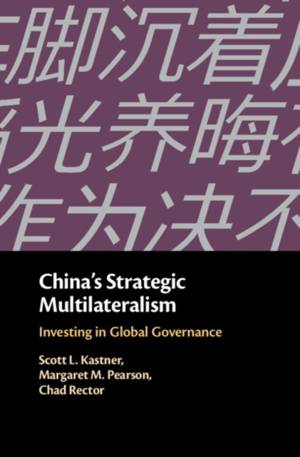
Door een staking bij bpost kan je online bestelling op dit moment iets langer onderweg zijn dan voorzien. Dringend iets nodig? Onze winkels ontvangen jou met open armen!
- Afhalen na 1 uur in een winkel met voorraad
- Gratis thuislevering in België vanaf € 30
- Ruim aanbod met 7 miljoen producten
Door een staking bij bpost kan je online bestelling op dit moment iets langer onderweg zijn dan voorzien. Dringend iets nodig? Onze winkels ontvangen jou met open armen!
- Afhalen na 1 uur in een winkel met voorraad
- Gratis thuislevering in België vanaf € 30
- Ruim aanbod met 7 miljoen producten
Zoeken
China's Strategic Multilateralism
Investing in Global Governance
Scott L Kastner, Margaret M Pearson, Chad Rector
Hardcover | Engels
€ 172,95
+ 345 punten
Omschrijving
China sometimes plays a leadership role in addressing global challenges, but at other times it free rides or even spoils efforts at cooperation. When will rising powers like China help to build and maintain international regimes that sustain cooperation on important issues, and when will they play less constructive roles? This study argues that the strategic setting of a particular issue area has a strong influence on whether and how a rising power will contribute to global governance. Two strategic variables are especially important: the balance of outside options the rising power and established powers face, and whether contributions by the rising power are viewed as indispensable to regime success. Case studies of China's approach to security in Central Asia, nuclear proliferation, global financial governance, and climate change illustrate the logic of the theory, which has implications for contemporary issues such as China's growing role in development finance.
Specificaties
Betrokkenen
- Auteur(s):
- Uitgeverij:
Inhoud
- Aantal bladzijden:
- 274
- Taal:
- Engels
Eigenschappen
- Productcode (EAN):
- 9781108429504
- Verschijningsdatum:
- 1/11/2018
- Uitvoering:
- Hardcover
- Formaat:
- Genaaid
- Afmetingen:
- 236 mm x 160 mm
- Gewicht:
- 521 g

Alleen bij Standaard Boekhandel
+ 345 punten op je klantenkaart van Standaard Boekhandel
Beoordelingen
We publiceren alleen reviews die voldoen aan de voorwaarden voor reviews. Bekijk onze voorwaarden voor reviews.











